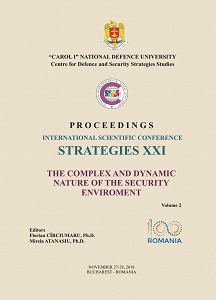DEFENSIVE STRATEGY OF SMALL COUNTRIES. THE CASE OF ROMANIA
DEFENSIVE STRATEGY OF SMALL COUNTRIES. THE CASE OF ROMANIA
Author(s): Marian Tuca
Subject(s): Civil Society, Security and defense, Welfare systems, Developing nations
Published by: Carol I National Defence University Publishing House
Keywords: small country; strategy; energy resources; geopolitical silence; energy aggression;
Summary/Abstract: After World War I and the Great Union of 1918, Romanian leaders were required to act for the recognition of the new frontiers by the great powers, counteracting the revisionist states and building regional alliances alongside the traditional alliance with the Western powers to guarantee stability in the region. Along the same line, the Royal Romanian House engages in the same strategy through matrimonial alliances with the royal houses of Greece and Yugoslavia. Romania adopts a security strategy characteristic for small countries, suitable to respond to the threats of revisionist states.In the post-war period, Romania enters the sphere of Soviet influence and is part of the Warsaw Treaty organization for continental security. After the collapse of the communist system and the security organization, Romania is making every effort to join NATO and the EU in order to ensure national security.
- Page Range: 248-253
- Page Count: 6
- Publication Year: 2018
- Language: English
- Content File-PDF

